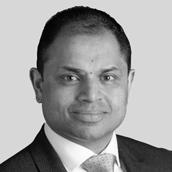
Amol Prabhu is CEO: South Africa & Market Head: Africa at Barclays, and Head of Private Banking: Africa. He has been with Barclays for more than 20 years and has supported its operations in Africa for more than a decade.
International mobility among ultra-high-net-worth individuals in Africa continues to rise, as they take an increasingly global outlook in their personal and professional lives. With family members and businesses in multiple locations across different continents, for some the notion of ‘home’ can be challenging to define and its location difficult to pinpoint.
Ultra-high-net-worth individuals across the globe are increasingly building their lives and legacies along international wealth corridors, shaped not only by their lifestyle and geographic preferences, but also by legal and regulatory frameworks that can facilitate their business and investment strategies, and Africa’s ultra-wealthy investors are no exception. Many are successful business owners with connectivity in multiple locations — particularly the Middle East, India, and as far as Singapore, as well as Switzerland, for their banking needs.

Most anglophone African countries retain strong links to the UK, ties that can be particularly powerful for ultra-high-net-worth families, whose members may have attended schools or universities in the country and who may even have worked there at one point or another. They also often own real estate in the UK, particularly in London, be it a second home, an investment property, or both.
The ability for a private bank to foster global connections is crucial at a time when ultra-wealthy families are global themselves. It’s increasingly feasible for a set of grandparents (often the originators of the family wealth) to reside somewhere such as Knysna in South Africa, while at least one of their children lives in the UK, another in Dubai, and have extended family (who are all part of the family global business) residing in India or Singapore.
Dubai and Singapore are among the top destinations for relocating ultra-high-net-worth families globally, especially those with business interests or looking to establish family offices in either hub. In the UAE, a relaxation of business regulations its attractive golden visa program are helping drive the popularity of cities such as Dubai.
Singapore meanwhile has seen tremendous growth in the family office space over the past three to four years. The country has long been a wealth hub for families in the region but is now attracting families from all around the world. Singapore is also emerging as a center of tech innovation, attracting a growing number of start-ups.
Managing wealth across borders in multiple locations requires both local expertise and a global perspective to find solutions to suit each family’s unique ambitions. A high degree of experience is required to navigate the complexities of multi-jurisdictional tax and legal landscapes.
Wealth preservation is a top priority for global families who want to ensure their wealth is safe and accessible regardless of its, or their, location. Allocating wealth across jurisdictions can help spread risk and mitigate the impact of any currency fluctuations, regulatory changes, or economic and political instability. It can also support future wealth creation by providing access to a wider range of investment opportunities across asset classes, geographies, sectors, and themes.
International diversification is not restricted to traditional investing (namely, equities and bonds) — real estate is often a popular choice, offering potential for income and capital returns as well as flexibility for families around where they work, live, or study. Private markets are also attracting growing interest.
Investing globally can also mean exposure to different legal and tax regimes and regulations, however, so it’s important to understand the potential implications.
For business owners, private wealth is often inextricably linked to their businesses, and there is growing demand for institutional services as a result.
These services can be across corporate banking including trade finance, payments, or working capital facilities, or investment banking support such as capital raising (public on an international stock exchange or private), or strategic M&A. In these cases, a combination of private and institutional support can mean a more seamless interaction between a family’s personal and business interests.
In a fast-moving global economy, and amid widespread geopolitical friction, it’s important to ensure the right expertise is deployed at the right time in order to keep global wealth on the front foot.
Competition and client needs fuel the necessity for innovative investment offerings. When it comes to overseas real estate, for example, Barclays provides UK and European mortgages based on a client’s local earnings in their home market, something that few other banks are able to do. It also allows for global investments in multi-asset portfolios through direct stock selection, which results in lower fees for clients.
In the private capital space, opportunities abound across sectors. Whether med-tech, fin-tech, or agri-tech, many companies are on accelerated growth trajectories and are looking for capital as well as expertise that can support their journey. Many of our clients are entrepreneurs themselves and are keen to invest and support other entrepreneurs. Barclays facilitates this through its Private Assets Programme, providing our clients with access to companies within our Barclays Accelerators and Digital Eagle incubators as well as the broader Barclays eco-system.
As ultra-high-net-worth individuals’ international mobility increases, it is incumbent on global private banks who wish to continue to provide a world-class service to be able to support these global families, both individually and holistically across locations, platforms, products, and generations. Doing this well takes hard work, focus, and seamless collaboration.
Henley & Partners assists international clients in obtaining residence and citizenship under the respective programs. Contact us to arrange an initial private consultation.

Have one of our qualified advisors contact you today.
We use cookies to give you the best possible experience. Click 'Accept all' to proceed as specified, or click 'Allow selection' to choose the types of cookies you will accept. For more information, please visit our Cookie Policy.